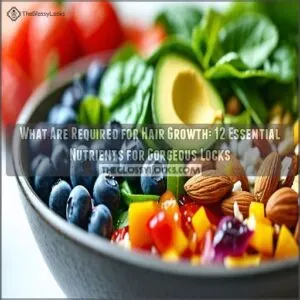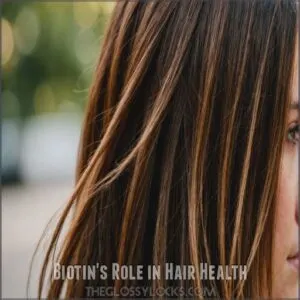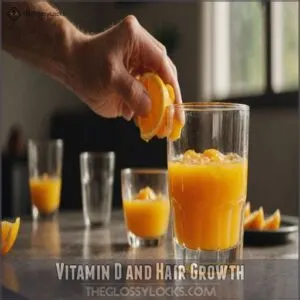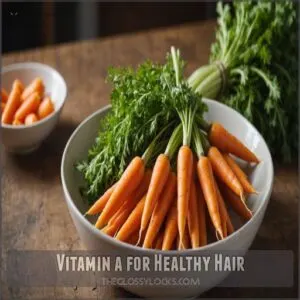This site is supported by our readers. We may earn a commission, at no cost to you, if you purchase through links.
 If you’re wondering what your hair needs to grow strong and healthy, you’re in luck.
If you’re wondering what your hair needs to grow strong and healthy, you’re in luck.
From essential vitamins like biotin and vitamin D to minerals like iron and zinc, there are a variety of key nutrients that play a vital role in stimulating hair growth, preventing loss, and keeping your mane vibrant.
Whether you’re dealing with thinning hair or just want to take your locks to the next level, focusing on a balanced diet rich in these hair-loving compounds can work wonders.
Just wait until you see the lush, shiny results!
But that’s just the tip of the iceberg – keep reading to discover the top 12 must-have nutrients for gorgeous hair.
Table Of Contents
- Key Takeaways
- Key Vitamins for Hair Growth
- Essential Minerals for Hair Growth
- Other Essential Nutrients for Hair Health
- Importance of Antioxidants for Hair Growth
- The Power of Beta-Carotene for Hair Growth
- Valuable Nutrients in Nuts & Seeds for Hair Growth
- Role of B Vitamins in Hair Growth
- Importance of Essential Fatty Acids for Hair Growth
- Impact of Trace Minerals on Hair Growth
- Significance of a Balanced Diet for Hair Growth
- Frequently Asked Questions (FAQs)
- What foods help hair growth?
- How can a healthy diet help hair growth?
- How do you get hair growth?
- How do you keep hair healthy?
- What is the main thing needed for hair growth?
- What products do you need for hair growth?
- What really helps your hair to grow?
- What vitamin is needed for hair growth?
- What factors contribute to premature hair loss?
- How can stress impact hair growth?
- What are the causes of dry, brittle hair?
- Can medications lead to hair thinning or shedding?
- How can hormonal changes affect hair growth patterns?
- Conclusion
Key Takeaways
- Nourish your hair with essential vitamins like biotin, vitamin D, A, C, and E to stimulate growth and prevent thinning.
- Ensure you get enough minerals like iron, zinc, and magnesium to maintain hair strength and health.
- Incorporate antioxidant-rich foods to protect your hair from free radical damage and environmental stressors.
- Eat a balanced diet rich in protein, omega-3s, and beta-carotene to support your hair’s structure and radiance.
Key Vitamins for Hair Growth
You’ll need more than just your trusty shampoo to maintain those luscious locks, as research shows that specific vitamins play essential roles in hair growth and strength.
While your body works hard to produce healthy hair, you can support this process by ensuring you’re getting the right vitamins through your diet or supplements, including biotin, vitamins D, A, C, and E.
Biotin’s Role in Hair Health
While biotin’s reputation as a hair growth superstar isn’t just hype, it’s essential to understand how this B-vitamin actually works.
You’ll find biotin naturally occurring in many foods, and it plays a key role in maintaining healthy hair growth.
- Biotin deficiency can lead to brittle nails and thinning hair
- Egg yolks pack the highest biotin content of any food
- Supplements only help if you’re actually deficient
- Your body needs just 30 micrograms daily for good hair health
Vitamin D and Hair Growth
Beyond fortified foods and supplements, your body makes vitamin D when exposed to sunlight.
Research suggests a strong link between vitamin D deficiency and hair loss, as this nutrient helps create new hair follicles.
You’ll find vitamin D naturally in fatty fish, egg yolks, and mushrooms.
If you’re experiencing hair loss, getting your vitamin D levels checked could be illuminating.
Vitamin a for Healthy Hair
Your hair’s health depends heavily on vitamin A, which helps produce sebum – your scalp’s natural conditioner.
If you’re running low on this nutrient, you might notice your locks getting dry and brittle.
Sweet potatoes, carrots, and spinach are packed with beta-carotene that your body converts to vitamin A.
But don’t go overboard – too much vitamin A can actually trigger hair loss.
Vitamin C’s Antioxidant Properties
Vitamin C is the unsung hero of hair growth, acting like a bodyguard for your hair follicles against free radical damage.
As a powerful antioxidant, it’s got some impressive tricks up its sleeve:
- Boosts collagen production to strengthen hair strands
- Helps your body absorb iron for better hair growth
- Protects hair follicles from environmental stress
- Supports the scalp’s natural defense system
Think of it as your hair’s personal shield, working 24/7 to keep those locks looking fabulous.
Vitamin E’s Hair Benefits
Packed with potent antioxidants, Vitamin E acts like a protective shield for your hair follicles.
It’s not just about growth – this powerhouse nutrient tackles multiple aspects of hair health.
You can even find a great Vitamin E Hair Serum online, perfect for boosting your locks from the inside out.
Here’s what you need to know:
| Benefit | How It Works | Food Sources |
|---|---|---|
| Scalp Protection | Fights free radicals | Almonds, sunflower seeds |
| Blood Flow | Improves circulation | Avocados, olive oil |
| Hair Strength | Prevents oxidative stress | Spinach, wheat germ |
| Hair Shine | Maintains natural oils | Hazelnuts, peanuts |
Essential Minerals for Hair Growth
You’ll need more than just vitamins to maintain those lustrous locks, as minerals play a key role in promoting healthy hair growth and strength.
Your hair follicles depend on essential minerals like iron, zinc, and magnesium to function properly, working together to support cell growth and prevent hair loss.
Iron’s Importance in Hair Production
When your body lacks iron, it prioritizes essential functions over hair growth, which can leave your locks feeling neglected.
Iron’s key role in oxygen transport means it helps deliver important nutrients to your hair follicles.
Without enough iron, you might notice thinning or excessive shedding.
The good news? Loading up on iron-rich foods like spinach, lentils, and lean meats can help keep your hair cycle flowing smoothly.
Zinc’s Influence on Hair Strength
Like iron, zinc plays a key role in your hair’s strength and growth.
If you’ve noticed your hair thinning, zinc deficiency might be the culprit, and you’re not alone – many men over 40 experience hair loss due to zinc deficiency, among other factors such as hair growth supplements for men.
Your body uses zinc to build and repair hair proteins.
You’ll find this mineral powerhouse in oysters, beef, pumpkin seeds, and lentils.
Don’t worry about supplements just yet – getting zinc through food is your best bet.
Magnesium’s Role in Hair Health
Magnesium helps your body create protein for hair growth and repair.
You’ll find this mineral working behind the scenes to regulate hormone levels that affect your hair growth cycle.
If you’re running low on magnesium, your scalp health might take a hit, leading to hair loss.
Getting enough through foods like leafy greens, nuts, and seeds keeps your hair growing strong.
Other Essential Nutrients for Hair Health
You’ll need more than just vitamins and minerals to grow those gorgeous locks you’re dreaming of.
Your hair also relies on protein, omega-3 fatty acids, selenium, and L-lysine to maintain its strength, shape, and overall health.
Protein’s Contribution to Hair Growth
Your hair’s building blocks rely heavily on protein – it makes up about 85% of each strand!
Without enough protein, your hair follicles can’t produce the keratin they need for growth.
You’ll want to include lean meats, eggs, fish, or plant-based options like lentils and quinoa in your diet.
A protein deficiency might show up as brittle, thinning hair, so don’t skimp on this essential nutrient.
Omega-3 Fatty Acids’ Hair Benefits
For healthy hair growth, omega-3 fatty acids are your secret weapon.
They nourish follicles from within, reduce inflammation, and help maintain scalp health.
You can also support your hair growth journey with omega 3 hair supplements.
Studies suggest that these essential fats can decrease hair loss and boost hair density.
You’ll find them abundantly in fatty fish like salmon and mackerel, plus plant sources including flaxseeds and walnuts.
Selenium’s Antioxidant Properties
Anyone looking to maintain healthy hair should understand selenium’s key role.
This powerful antioxidant helps protect your follicles from oxidative stress and supports overall hair health.
Here’s what selenium does for your locks:
- Fights free radicals that can damage hair follicles
- Activates enzymes that protect against oxidative stress
- Supports thyroid function, which influences hair growth
- Helps maintain scalp health
Brazil nuts pack the biggest selenium punch, but don’t overdo it – one or two daily is plenty.
L-lysine’s Role in Hair Shape and Volume
L-lysine, a building block of protein, shapes hair like an architect designs a building.
This amino acid helps create the strong, voluminous locks you’re after.
Getting enough L-lysine from foods like eggs, meat, beans, and spirulina keeps your hair from becoming thin or brittle.
If you’re not consuming enough, your hair might lose its bounce and fullness – a clear sign it’s time to boost your intake.
Importance of Antioxidants for Hair Growth
Your hair’s constant battle against free radicals from pollution, UV rays, and stress can leave it looking dull and damaged, but you’ll be glad to know that antioxidants are your hair’s natural defense squad.
By incorporating antioxidant-rich foods into your diet, you’re giving your hair the protective shield it needs to stay strong and healthy, just like a superhero’s force field against villainous free radicals.
Free Radicals and Hair Damage
Free radicals are like tiny troublemakers that can wreak havoc on your hair follicles.
These unstable molecules, created by things like pollution, UV rays, and stress, damage your hair’s proteins and lipids.
Think of them as rust on metal – they break down your hair’s structure from the inside out, leading to weaker strands, breakage, and even premature graying.
Understanding this enemy is your first step toward healthier hair.
Antioxidants’ Role in Hair Protection
Antioxidants work like your hair’s personal bodyguards, fighting off those pesky free radicals that can damage your locks.
Here’s how these microscopic defenders protect your hair:
- They neutralize harmful molecules before they can break down hair proteins
- They help maintain the natural oils that keep your scalp healthy, and can be found in various supplements like Natural Hair Growth Supplements, which often include ingredients such as biotin, vitamin C, and omega-3 fatty acids.
- They shield hair follicles from environmental stress and UV damage
Think of antioxidants as your hair’s invisible shield, working 24/7 to keep it strong and vibrant.
Foods Rich in Antioxidants for Hair Health
Berries are brimming with antioxidants that can safeguard your hair from damaging free radicals.
Indulge in juicy strawberries, blueberries, and raspberries – they’re packed with vitamin C, which helps strengthen hair and stimulate growth.
And don’t forget the antioxidant superstars like spinach, loaded with vitamins A and C to keep your locks lush.
The Power of Beta-Carotene for Hair Growth
You’re in luck – beta-carotene is a powerful antioxidant that can work wonders for your hair.
Found in vibrant fruits and veggies like sweet potatoes and carrots, beta-carotene helps protect hair follicles and promote healthy growth.
Beta-Carotene’s Antioxidant Properties
Beta-carotene, a powerful antioxidant, can work wonders for your hair.
This natural pigment helps shield your luscious locks from the damaging effects of free radicals, preventing breakage and promoting healthy growth.
By neutralizing these pesky molecules, beta-carotene safeguards your hair and skin, keeping them radiant and strong.
Foods Rich in Beta-Carotene
Want glowing, healthy hair?
Foods rich in beta-carotene are a great option.
This powerful antioxidant nourishes hair follicles and protects strands from damage.
Load up on these beta-carotene superstars:
- Carrots
- Pumpkin
- Kale
- Cantaloupe
By incorporating these vibrant foods into your diet, you’ll be well on your way to luscious, radiant locks.
Sweet Potatoes
Sweet potatoes are a beta-carotene powerhouse, packing a punch for your hair’s health.
This vibrant veggie helps combat free radicals, shielding your locks from damage and supporting strong, lustrous growth.
Whip up a nourishing sweet potato hair mask for a DIY dose of this hair-boosting nutrient.
Your tresses will thank you!
Carrots
Carrots are a vitamin A superstar that can keep your hair looking lush and vibrant.
These bright orange veggies are packed with beta-carotene, an antioxidant that supports hair growth and health.
Plus, carrot juice can even be used as a natural DIY carrot hair dye.
Incorporate carrots into your diet through:
- Carrot juice or smoothies
- Roasted carrots as a side dish
- Grated carrots in salads
- Carrot cake or muffins
Valuable Nutrients in Nuts & Seeds for Hair Growth
You’d be nuts not to load up on these hair-nourishing powerhouses.
From biotin-rich walnuts to vitamin E-packed almonds, these nutritious nuts and seeds can give your locks the boost they need to thrive.
Biotin-Rich Nuts and Seeds
Your hair could use a biotin boost? Reach for a handful of nuts and seeds! These nutritional powerhouses brim with hair-healthy biotin.
Top your morning oatmeal with these biotin superstars:
| Nuts & Seeds | Biotin (mcg) per 1 oz |
|---|---|
| Almonds | 1.5 |
| Peanuts | 17 |
| Walnuts | 0.6 |
| Pecans | 0.6 |
| Sunflower Seeds | 2.6 |
Biotin aids in protein synthesis, keeping your strands strong and resilient.
Snack on these biotin-rich gems daily for gorgeous, glowing hair.
Vitamin E-Rich Nuts and Seeds
Vitamin E-rich nuts and seeds are a powerhouse for your luscious locks.
These hair-friendly treats boast alpha-tocopherol, a potent antioxidant that shields hair follicles from free radical damage.
Try adding 1. almonds, 2. sunflower seeds, and 3. hazelnuts to your diet for an effortless hair-health boost.
Beauty benefits never tasted so good!
Omega-3 Rich Nuts and Seeds
Munch on walnuts, chia seeds, and flaxseeds – they’re powerhouses of essential omega-3 fatty acids that may help nourish your locks.
Omega-3s fight inflammation, which can stunt hair growth.
Plus, these nutty superfoods pack protein, biotin, and zinc – all important for healthy, lush hair.
| Nut/Seed | Omega-3 Content |
|---|---|
| Walnuts | 2.5 g per ounce |
| Chia Seeds | 5 g per ounce |
| Flaxseeds | 6 g per ounce |
Keep your hair happy and healthy by snacking on these omega-3 superstars.
Role of B Vitamins in Hair Growth
You may not realize it, but B vitamins like biotin and B12 play a key role in keeping your hair looking its best.
Biotin helps strengthen hair and prevent breakage.
B12 deficiency can lead to thinning locks – so be sure your diet provides these essential hair-healthy nutrients.
Biotin’s Hair Growth Benefits
If you struggle with thinning hair or hair loss, look to biotin to help boost your hair health.
Biotin plays a key role in strengthening and growing your locks, especially since true biotin deficiency can lead to symptoms like thinning hair or even hair loss, which can be addressed through biotin supplements for hair growth.
As a B vitamin, biotin plays a key role in the strength and growth of your locks.
Munch on biotin-rich foods like eggs, nuts, seeds, and sweet potatoes to nourish your hair from within.
Vitamin B12’s Role in Hair Loss
While vitamin B12 deficiency is often associated with anemia, it can also contribute to hair loss.
If you’re shedding more strands than usual, a quick B12 test could reveal the culprit.
Luckily, getting enough of this essential nutrient through B12-rich foods or supplements may help stop the thinning.
Folic Acid’s Hair Growth Benefits
Folic acid, a B vitamin, may also contribute to lush, beautiful locks.
This essential nutrient aids in red blood cell formation, which delivers oxygen to hair follicles – promoting growth.
If you’re deficient in folate, hair loss could be a side effect.
Load up on leafy greens, citrus fruits, and legumes to keep your hair happy and healthy.
Importance of Essential Fatty Acids for Hair Growth
If you’re looking to give your locks a boost, you’ll be glad to know that essential fatty acids play a key role in hair growth.
From promoting scalp health to strengthening strands, incorporating omega-6s into your diet can do wonders for your gorgeous mane.
Omega-6 Fatty Acids’ Hair Benefits
For healthy hair growth, omega-6 fatty acids are essential.
These essential fats help nourish hair follicles and promote a shiny, lustrous appearance.
Research suggests omega-6s may even reduce hair loss by combating inflammation and protecting against damage from free radicals.
Incorporate omega-6-rich foods like nuts, seeds, and plant oils to support your hair’s health.
Foods Rich in Essential Fatty Acids
Essential fatty acids are essential for luscious locks.
Incorporate these power-packed foods into your diet:
fatty fish like salmon, mackerel, and tuna;
plant-based sources like flaxseeds, chia seeds, and walnuts;
and oils such as flaxseed, olive, and avocado oil.
These nourishing fats promote scalp and hair follicle health for stronger, shinier hair.
Impact of Trace Minerals on Hair Growth
Trace minerals, such as zinc, iron, and selenium, play a pivotal role in maintaining healthy, lustrous hair.
For instance, zinc deficiency can lead to hair loss and thinning, as this mineral is essential for cell division and protein synthesis within hair follicles.
Similarly, iron deficiency anemia – a common culprit behind excessive shedding – impairs oxygen delivery to hair roots, stunting growth.
| Mineral | Function | Good Sources |
|---|---|---|
| Zinc | Cell division, protein synthesis | Oysters, red meat, poultry, beans |
Significance of a Balanced Diet for Hair Growth
You may be surprised to learn that the foods you eat can have a significant impact on the health and growth of your hair.
By nourishing your body with a balanced diet rich in essential vitamins, minerals, and nutrients, you can support the strength, shine, and lushness of your locks.
Foods to Eat for Hair Growth
Prioritize protein-rich foods like eggs, fish, and lean meats to nourish your hair from the inside out.
Biotin-packed foods such as sweet potatoes, spinach, and nuts are hair growth superstars.
Don’t forget antioxidant-rich berries and omega-3-packed salmon to fortify your locks.
A balanced diet is the key to gorgeous, healthy hair.
Foods to Avoid for Hair Growth
Steer clear of certain foods that can hinder your hair’s growth. Avoid processed items loaded with preservatives, sugary drinks that can disrupt your scalp’s health, and fast food high in saturated fat.
Include natural hair growth remedies like ginger and onion juice in your routine to boost scalp health.
Limit alcohol, which can dehydrate your strands, and excessive salt, which may cause inflammation.
With a balanced diet, you’ll nourish your hair from the inside out.
- Processed Foods
- Sugary Drinks
- Alcohol
- Fast Food
- Excessive Salt
Importance of Adequate Nutrition for Hair Health
Your hair’s nourishing needs extend far beyond topical treatments – a balanced diet rich in essential nutrients is key for stunning strands.
From protein and biotin to omega-3s and iron, adopt these healthy eating habits to amplify your hair’s natural beauty.
If you’re struggling to get these nutrients from whole foods, consider supplementing with hair growth vitamins like those found at Hair Growth Supplements.
| Nutrient | Role in Hair Health | Good Sources |
|---|---|---|
| Protein | Supports hair growth and strength | Eggs, lean meats, fish, legumes |
| Biotin | Key for keratin production | Eggs, nuts, seeds, sweet potatoes |
| Omega-3s | Reduce inflammation, promote growth | Fatty fish, walnuts, chia seeds |
| Iron | Aids oxygen delivery to follicles | Spinach, lentils, red meat |
| Vitamin C | Boosts collagen for stronger hair | Citrus fruits, bell peppers, broccoli |
Frequently Asked Questions (FAQs)
What foods help hair growth?
Hair hankering for a boost?
Salmon, spinach, and eggs are hair’s loyal sidekicks, packing the nutrients it craves.
Chow down on these superfoods, and watch your locks flourish like a lush garden.
How can a healthy diet help hair growth?
Eating a nutrient-rich diet is key for healthy hair growth.
Load up on protein, vitamins, and minerals like biotin, iron, and zinc to nourish hair follicles and prevent shedding.
A balanced plate fuels your locks to flourish.
How do you get hair growth?
Fuel your locks with nutrients by savoring a balanced diet rich in biotin, protein, and vitamins A, C, and D.
Pair it with gentle haircare routines to nourish your strands from within and without.
How do you keep hair healthy?
To keep your hair healthy, be gentle when brushing and styling, use gentle, sulfate-free shampoo, and protect it from heat damage.
Heat damage can really take a toll on your hair, so be sure to use heat protectant products when styling.
Eating a balanced diet rich in hair-nourishing nutrients can also work wonders for your mane.
What is the main thing needed for hair growth?
Maintaining a balanced diet rich in hair-healthy nutrients like protein, biotin, and vitamins is the key to promoting lush, full locks.
Gentle hair care practices are also important for promoting hair growth.
What products do you need for hair growth?
You’ll need biotin-rich foods, omega-3s from fatty fish, and iron-packed spinach to nourish your hair. Pair this with gentle haircare and you’re on your way to luscious locks.
What really helps your hair to grow?
Ah, the secret to luscious locks?
It’s no fairy tale – just nourish your hair from within with a balanced diet rich in protein, vitamins, and minerals.
Your strands will thank you, darling!
What vitamin is needed for hair growth?
Biotin’s your best bet for healthy hair growth.
This B vitamin supports keratin production, keeping strands strong and lush.
Toss some eggs or almonds into your diet to get an extra biotin boost.
What factors contribute to premature hair loss?
Stress, poor diet, lack of vitamin D, hormone imbalances, and medical conditions can all wreak havoc on your hair, causing premature shedding and thinning.
Nip these culprits in the bud to grow stronger, luscious locks.
How can stress impact hair growth?
When you’re feeling frazzled, your hair may pay the price.
Chronic stress can disrupt the hair growth cycle, leading to thinning, shedding, and slower regrowth.
But don’t worry – managing your stress can help hair bounce back.
What are the causes of dry, brittle hair?
Did you know that nearly 40% of women experience some degree of hair brittleness?
Factors like harsh products, overstyling, and nutrient deficiencies can leave your locks dry, dull, and prone to breakage.
Try gentler haircare and a nutrient-rich diet to restore bounce and shine.
Can medications lead to hair thinning or shedding?
Certain medications like chemotherapy drugs and antidepressants can definitely lead to hair thinning or shedding.
If you notice excessive hair loss, talk to your doctor about adjusting your medications or trying treatments to counteract the side effects.
How can hormonal changes affect hair growth patterns?
Hormonal changes can ruffle your hair’s routine, like a moody teenager.
Shifts in estrogen, testosterone, and thyroid hormones may have your hair sprouting, shedding, or just plain sulking.
But don’t worry – your locks will bounce back.
Conclusion
With the right blend of hair-nourishing vitamins, minerals, and other key nutrients, you can grow stronger, healthier hair from the inside out.
From biotin to vitamin D, iron to omega-3s, this detailed guide outlines the essential compounds required for what’re required for hair growth.
Incorporate these nutrients into your diet, and watch your locks transform into a gorgeous, lustrous mane.






